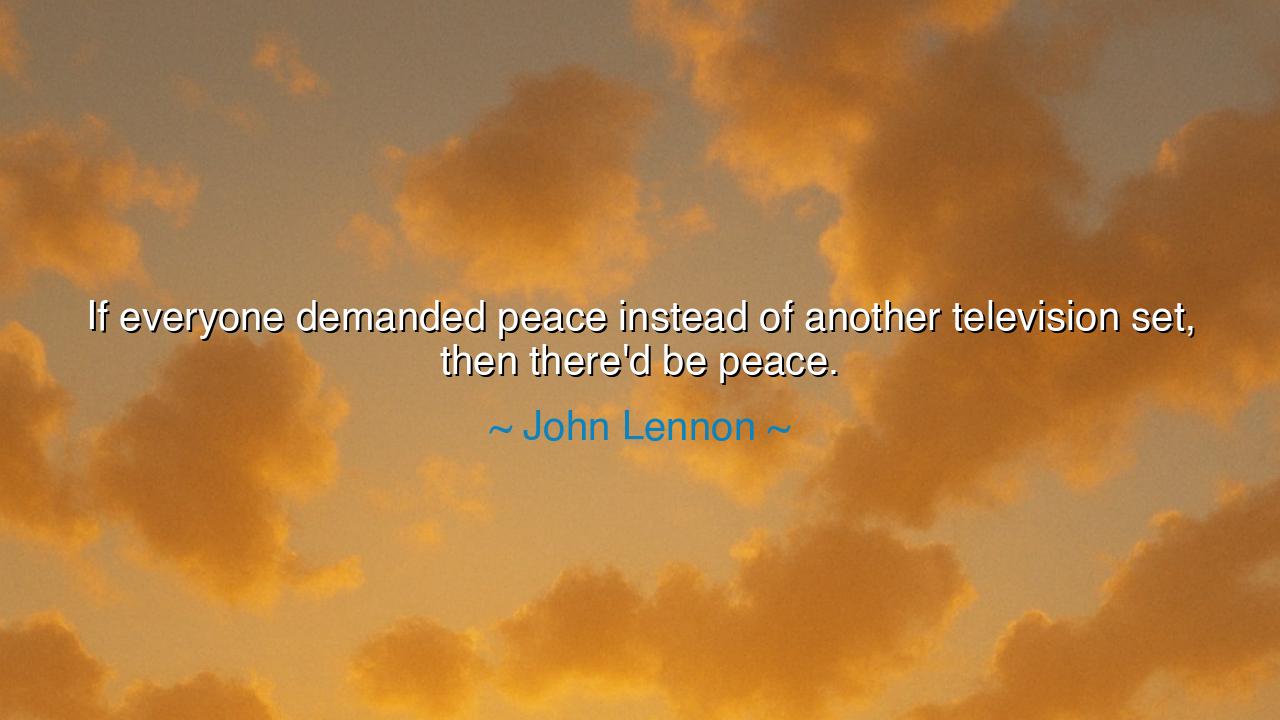
If everyone demanded peace instead of another television set






The words of John Lennon — “If everyone demanded peace instead of another television set, then there’d be peace.” — resound as both a lament and a prophecy. In this statement, Lennon, the poet-musician of a generation, strips down the causes of unrest to their most human core: the misplaced priorities of mankind. He saw in his time, and we see in ours, how easily the human heart is distracted by the glitter of possessions, by the lure of consumption, while the higher pursuit of harmony and justice is left untended. His words strike like an ancient oracle reminding us: if the desires of the many were turned toward peace with the same hunger with which they chase comfort, the world itself would be transformed.
The television set in Lennon’s quote stands not only for material wealth, but for every trinket of distraction that people pursue in place of deeper truths. It is the symbol of consumerism — the hunger for one more object, one more indulgence, one more fleeting comfort. Yet the world does not lack televisions, nor food, nor clothing in abundance. What it lacks is the collective will to seek peace as fiercely as it seeks pleasure. Lennon’s cry is not against technology itself, but against a misplaced desire: the choosing of shallow gain over eternal good.
History offers us countless warnings of this misplacement. In the twilight of Rome, citizens clamored for bread and circuses, for entertainment and distraction, while their republic crumbled into empire and their empire into ruin. They demanded shows in the arena but not justice in the streets, spectacles of blood but not harmony among nations. Their fall stands as testimony that a society that prizes its “television sets” over its peace has already sown the seeds of its collapse.
And yet, we also have shining examples of those who chose rightly. Consider the life of Mahatma Gandhi, who rejected excess and pursued peace as his life’s treasure. He wore simple cloth, lived simply, and taught millions that freedom and harmony were worth more than gold or possessions. His nonviolent struggle shook an empire and freed a nation, proving that when people demand peace with their whole being, the powerful tremble and the world changes. Gandhi’s life shows us what Lennon meant: when desire is shifted from material craving to the hunger for justice, then peace is not a dream but a living force.
Lennon’s words are also a challenge to every individual. For peace is not forged only in treaties between nations, but in the hearts of common men and women. If one person demands peace in their household rather than another gadget, there is peace in a family. If a community demands peace rather than rivalry, there is harmony among neighbors. If nations demand peace over dominance, the world breathes more freely. But if people continue to direct their longing toward possessions, peace will remain scarce, for the markets of greed are filled, while the altars of justice stand empty.
The lesson for the generations is unmistakable: what you desire shapes the world. If your cry is for wealth, wealth will grow, but so will envy. If your cry is for entertainment, distraction will spread, but so will emptiness. If your cry is for peace, then the currents of history will bend toward it, for the world follows the collective longing of humanity. Every soul must therefore examine itself and ask: what is it that I am demanding from life?
In practice, let each listener take simple yet powerful steps. Choose dialogue instead of division. Value relationships above possessions. Spend less time feeding the hunger for things, and more time cultivating compassion and justice. Replace one desire for excess with one act that fosters peace — whether reconciliation with a friend, kindness to a stranger, or generosity to the poor. Each small choice builds the larger reality, and when multiplied across the earth, becomes the very thing Lennon envisioned.
Thus his words remain not only as a critique of his own age but as prophecy for ours: “If everyone demanded peace instead of another television set, then there’d be peace.” Let this be a reminder passed down to future generations — that the world will always give you what you most hunger for. Hunger for possessions, and you will have them but lose your soul. Hunger for peace, and you will build a world that endures.






AAdministratorAdministrator
Welcome, honored guests. Please leave a comment, we will respond soon